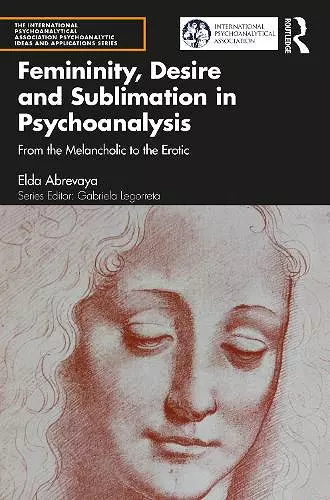Femininity, Desire and Sublimation in Psychoanalysis
From the Melancholic to the Erotic
Format:Paperback
Publisher:Taylor & Francis Ltd
Published:12th Aug '22
Currently unavailable, and unfortunately no date known when it will be back
This paperback is available in another edition too:
- Hardback£135.00(9781032140803)

Femininity, Desire and Sublimation in Psychoanalysis explores female subjectivity and examines the complexities inherent in psychoanalytic work realized by women analysts with women.
The book includes a critical study of psychoanalytic theories on femininity as well as a reflection on social aspects of gender. Elda Abrevaya envisages different paths to femininity, illustrated in the text with studies of Virginia Woolf and Marguerite Duras, and examines the vicissitudes of the relation of the little girl with the mother, and her crucial challenge, which is separation from the mother, in order to access erotic life and the use of cultural objects. Femininity, Desire and Sublimation in Psychoanalysis also explores the question of sublimation, shedding light on a field that has not been sufficiently explored in terms of female sexuality and female identity. Throughout the book, sublimation in women comes to the forefront as a source of satisfaction, liberation and participation in public life.
The book will be important reading for psychoanalysts and other clinicians in the field of mental health as well as academics in the fields of gender studies, literature, philosophy and sociology.
"Elda Abrevaya introduces us to a very interesting journey which starts with a deep analysis of the notion of femininity focusing on a crucial topic little explored: women’s sublimation, sometimes considered a masculine attribution. She develops the concept of early femininity, based on the original mother/child relation and its strong investment in the little girl. Notions such as primary homosexuality, 'dead mother', matricide, countertransference in women analysts go through the text enriched with clinical cases as well as with writings of Woolf, Duras, De Beauvoir, Kristeva and others.
Following this thread, the author tackles the challenge of providing a metapsychological understanding of sublimation in women as a source of jouissance connected to the resolution of the mother complex. Abrevaya constructs a network that allows mapping the text in different ways towards a better comprehension of sublimation in women. This conceptual path makes it highly recommended for psychoanalysts but also for those readers interested in this topic."
Leticia Glocer Fiorini, Training Analyst of the Argentine Psychoanalytic Association; Chair of the "Sexual and Gender Diversity Studies" Committee, IPA
"Psychoanalysis embraces a passion for the origins. It is also true when the theorist essays to grasp a question, here the figures of femininity. Elda Abrevaya’s work shows a remarkable psychoanalytic culture, as illustrated by the return to the Freudian source or by the recognition of the vivacity of further debates (M. Klein, Winnicott, Lacan, Laplanche and so on). The axis of the homosexuality mother-daughter, in the history of the subject as well as in the transference, occupies a privileged position. Between theory and the clinic and following the analytic treatments of Fatma, Aisha, Andy… a return to the sources that does not impede the author to question the contemporary challenges and the new conflicts which appear, as in motherhood or in the issue of gender.
The place accorded to sublimation, in opposition to the restrictive point of view of Freud, notably in reference to writing (Virginia Woolf, Marguerite Duras), concludes with clarity this itinerary full of subtlety of the multiple faces of femininity."
Jacques André, Psychoanalytic Association of France; author, Aux Origines Féminines de laSexualité
"Elda Abrevaya introduces us to a very interesting journey which starts with a deep analysis of the notion of femininity focusing on a crucial topic little explored: women’s sublimation, sometimes considered a masculine attribution. She develops the concept of early femininity, based on the original mother/child relation and its strong investment in the little girl. Notions such as primary homosexuality, 'dead mother', matricide, countertransference in women analysts go through the text enriched with clinical cases as well as with writings of Woolf, Duras, De Beauvoir, Kristeva and others.
Following this thread, the author tackles the challenge of providing a metapsychological understanding of sublimation in women as a source of jouissance connected to the resolution of the mother complex. Abrevaya constructs a network that allows mapping the text in different ways towards a better comprehension of sublimation in women. This conceptual path makes it highly recommended for psychoanalysts but also for those readers interested in this topic."
Leticia Glocer Fiorini, Training Analyst of the Argentine Psychoanalytic Association; Chair of the "Sexual and Gender Diversity Studies" Committee, IPA
"Psychoanalysis embraces a passion for the origins. It is also true when the theorist essays to grasp a question, here the figures of femininity. Elda Abrevaya’s work shows a remarkable psychoanalytic culture, as illustrated by the return to the Freudian source or by the recognition of the vivacity of further debates (M. Klein, Winnicott, Lacan, Laplanche and so on). The axis of the homosexuality mother-daughter, in the history of the subject as well as in the transference, occupies a privileged position. Between theory and the clinic and following the analytic treatments of Fatma, Aisha, Andy… a return to the sources that does not impede the author to question the contemporary challenges and the new conflicts which appear, as in motherhood or in the issue of gender.
The place accorded to sublimation, in opposition to the restrictive point of view of Freud, notably in reference to writing (Virginia Woolf, Marguerite Duras), concludes with clarity this itinerary full of subtlety of the multiple faces of femininity."
Jacques André, Psychoanalytic Association of France; author, Aux Origines Féminines de laSexualité
ISBN: 9781032140810
Dimensions: unknown
Weight: 453g
126 pages